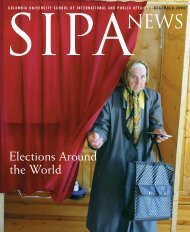Promoting IDPs' and Women's Voices in Post-Conflict Georgia
Promoting IDPs' and Women's Voices in Post-Conflict Georgia
Promoting IDPs' and Women's Voices in Post-Conflict Georgia
- No tags were found...
Create successful ePaper yourself
Turn your PDF publications into a flip-book with our unique Google optimized e-Paper software.
will<strong>in</strong>g to challenge authorities that provide them with essential <strong>in</strong>come <strong>and</strong> services, thereforesupport<strong>in</strong>g the current government through votes but otherwise exercis<strong>in</strong>g m<strong>in</strong>imal efforts to promotetheir own needs <strong>and</strong> <strong>in</strong>terests. 479Displacement also has endur<strong>in</strong>g effects on IDPs’ ability to jo<strong>in</strong> networks that could help them accessemployment <strong>and</strong> ga<strong>in</strong> greater economic stability. As an IDP from Abkhazia, noted, “In this country, a clanmentality rema<strong>in</strong>s <strong>and</strong> nobody gets hired from the street; it has to be some k<strong>in</strong>d of connection…” 480IDPs’ liv<strong>in</strong>g situations may also affect their access to networks. While IDPs liv<strong>in</strong>g <strong>in</strong> collective centers maybe less <strong>in</strong>tegrated with the non-displaced community, they are often more closely connected to oneanother than are IDPs liv<strong>in</strong>g <strong>in</strong> private accommodation simply because of proximity. Those liv<strong>in</strong>g <strong>in</strong>collective centers may therefore be able to form new networks among themselves that may help themaccess resources. For example, IDPs <strong>in</strong> one center “might have a family connection with a community <strong>in</strong>another collective center not far away. 481 These networks often rema<strong>in</strong> <strong>in</strong>sular, however, limit<strong>in</strong>g IDPs’access to opportunities to participate <strong>in</strong> society among the broader population.At the same time, these stronger ties among IDPs <strong>in</strong> collective centers enable community engagement.A senior fellow from the <strong>Georgia</strong>n Foundation for Strategic <strong>and</strong> International Studies, states, “theytogether could really mobilize better themselves. For example, they could stop the traffic on the street iftheir electricity was not supplied or if their pensions were not raised.” He expresses concern at thegovernment’s effort to resettle IDPs <strong>in</strong> that it may adversely affect their opportunities to organizecollectively: “Now they are dispersed physically, this also weakens their potential to <strong>in</strong>fluence decisionmak<strong>in</strong>g.”482 The resettlement policies may <strong>in</strong> fact work aga<strong>in</strong>st any effort that IDPs had developed tomobilize their communities, serv<strong>in</strong>g as an additional factor <strong>in</strong>fluenc<strong>in</strong>g participation.On the other h<strong>and</strong>, IDPs liv<strong>in</strong>g <strong>in</strong> private accommodations are more l<strong>in</strong>ked with the general population<strong>and</strong> have the possibility to build networks that go beyond the displaced communities. Medea Turashvili,from the International Crisis Group observed that “once [IDPs] are settled <strong>in</strong> private accommodations,they are more active, more outspoken. I don't know why, maybe because <strong>in</strong>tegration is higher, they arenot stuck <strong>in</strong> this one build<strong>in</strong>g. 483Interviews with a number of displaced persons of a higher socioeconomic status supported this po<strong>in</strong>t ofview. Many of them had overcome significant barriers, liv<strong>in</strong>g <strong>in</strong> collective centers <strong>and</strong> states of povertyfollow<strong>in</strong>g their displacement. They have s<strong>in</strong>ce taken advantage of economic <strong>and</strong> employmentopportunities to <strong>in</strong>tegrate <strong>in</strong>to ma<strong>in</strong>stream society, <strong>and</strong> some of them have also purchased their ownhomes. IDP identity plays a different role for these IDPs – some of them actively identify with this status<strong>and</strong> have taken on this cause politically, while others f<strong>in</strong>d that it has become less relevant <strong>in</strong> their lives479 Nana Sumbadze, Personal Interview.480 IDP woman. Personal <strong>in</strong>terview. 15 March 2012.481 T<strong>in</strong>a Gewis, Personal <strong>in</strong>terview.482 Senior Fellow, Personal Interview.483 Turashvili, Medea (International Crisis Group). Personal <strong>in</strong>terview. 13 March 2012.93

















